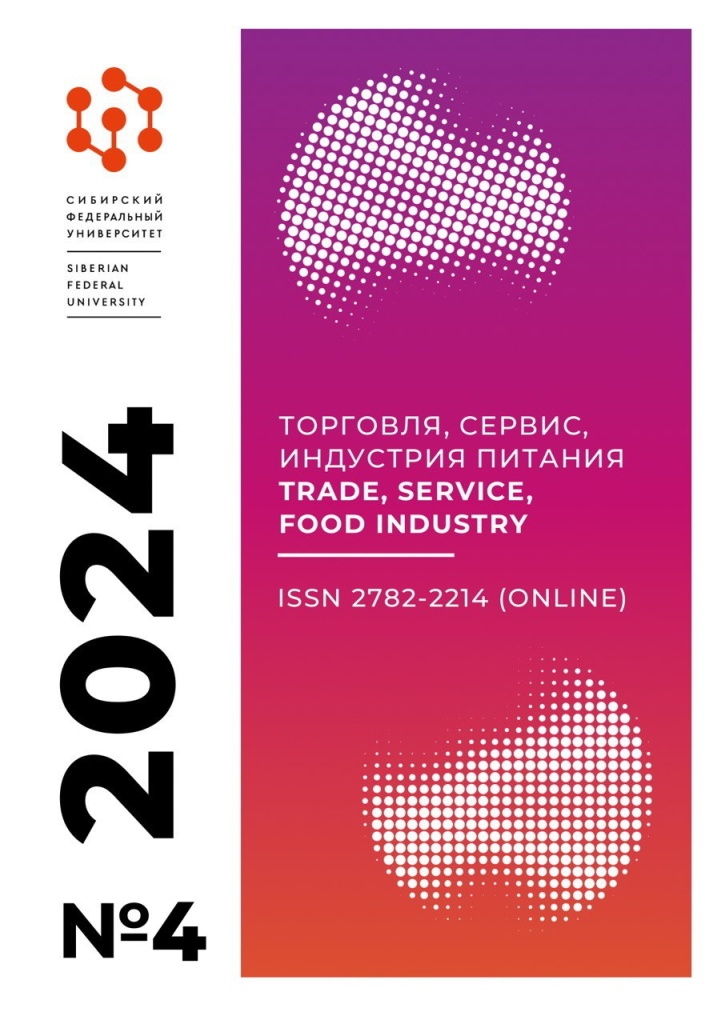Omsk, Russian Federation
UDC 338.46
Digital transformation in the modern world inevitably affects every area of business, including the sphere of consumer services. The development of digital services creates new opportunities to improve the processes of providing household services, optimize interaction with customers and increase competitiveness in the household services market. This article examines trends in the development of digital services in the field of consumer services. The analysis of the development of household services in Russia is generalized. The author's view is given on the concept of “household services” as a complex of business processes, each of which needs management and digital integration. An example of a process map for performing work in the field of consumer services using digital services and ecosystems is presented. The author interprets the ecosystem as a network system of interactions and relationships between participants (stakeholders) of business activities in the service sector. Based on this logic, it is proposed to consider a digital service as an element (part) of a service sector business process that can function within an ecosystem and through which value is exchanged. The characteristics of a digital service are presented on the basis of an institutional-axiological approach, which distinguishes the author’s view of the category “digital service” from existing points of view in science. Digital services in the business process of providing services that exist at the present stage of development are considered. Modern digital services are becoming not just a tool, but also a strategic resource that can make a business more competitive, sustainable and successful in the long term. The article is relevant for researchers and specialists in the field of small business in the service sector.
personal services, process improvement, optimization of interaction with customers, digital services, digital technologies, ecosystems
1. Volume of paid services to the population in the Russian Federation. [Electronic source]. URL: https://rosstat.gov.ru/uslugi (Date of access: 24.04.2024).
2. Paid services to the population in Russia. 2023. Statistical collection. Rosstat (2023). Moscow, 115.
3. Vargo, S. L., Maglio, P. P., Akaka, M. A. (2008). On value and value creation: a service systems and service logic perspective. European Management Journal, 26(3), 145–152.
4. Wessel, M. (2017). Creating Value in a digital economy. [Electronic source] URL: https://hbr.org/webinar/2017/01/creating-value-in-a-digital-economy (Date of access: 24.04.2024).
5. Grönroos, S. (2017). On Value and Value Creation in Service: A Management Perspective. Journal of Creating Value, Vol. 3, Is. 2, 125–141. [Electronic source] URL: https://doi.org/10.1177/2394964317727196 (Date of access: 24.04.2024).
6. Yakimov, A. S., Bazhenov, R. I. (2017). Review of services for selling digital content. Modern scientific research and innovation, 1(69), 521–526.
7. Order of the Ministry of Telecom and Mass Communications of Russia dated August 1, 2018 N 428 “On approval of Explanations (methodological recommendations) for the development of regional projects within the framework of federal projects of the national program “Digital Economy of the Russian Federation”. [Electronic source] URL: https://www.consultant.ru/document/cons_doc_LAW_343571/ (Date of access: 24.04.2024).
8. Zaramenskikh, E. P. (2018). Digital services: their attributes and relationship with enterprise architecture. Bulletin of the State University of Management, 10, 36–42.
9. Tolochko, N. K., Romanyuk, N. N. (2018). Digital technologies in technical services. Digitalization of the agro-industrial complex: collection of scientific articles of the I International Scientific and Practical Conference, Tambov, October 10–12, 2018. In 2 volumes. Vol. 1. Tambov: IC FSBEI TSTU, 141–143.
10. Lashkova, N. G. (2021). Issues of development of the enterprise business process management system in the conditions of digital information and communication technologies. Bulletin of the St. Petersburg State University of Technology and Design, 2, 42–46.
11. Sheresheva, M. Yu, Bek, M. A. Bek, N. N. (2014). Methodology for studying network forms of business organization: monograph. Moscow: Higher School of Economics, 296.
12. Simchenko, N. A., Reus, S. P., Tsekhla, S. Yu. (2020). Transformation of institutions of network interaction of economic agents in the digital economy. Theoretical Economics, 5(65), 29–35.
13. Legchilina, E. Yu., Gruzdo, A. D. (2023). Theoretical approaches to managing the development of small business ecosystems. Innovative activity, 1(64), 103–114.
14. Green Carmichael, S. The Flash Report: The Global Digital Economy. [Electronic source] URL: https://hbr.org/2016/04/the-flash-report-the-global-digital-economy (Date of access: 24.04.2024).
15. Iandoli, L., Gibaldi, C. (2023). Cases on Digital Entrepreneurship: How Digital Technologies are Transforming the Entrepreneurial Process in Existing Businesses and Start-ups. Cheltenham: Edward Elgar Publishing, 288.
16. Ecosystems of Russia. Players, services, subscriptions, user experience 2018–2024. [Electronic source] URL: https://ict.moscow/research/ekosistemy-rossii-igroki-servisy-podpiski-polzovatelskii-opyt-2018-2024/ (Date of access: 24.04.2024).
17. Moore, J. F. (1996). The death of competition: Leadership and strategy in the age of business ecosystems. New York: Harper Business, 320.
18. Spigel, B., Stam, E. (2018) Entrepreneurial ecosystems. The SAGE handbook of entrepreneurship and small business. London: SAGE Publications. [Electronic source] URL: https://www.research.ed.ac.uk/en/publications/entrepreneurial-ecosystems (Date of access: 24.04.2024).
19. Mason, K., Brown, R. (2014). Entrepreneurial Ecosystems and Growth Entrepreneurship. Final Report to the OECD. Paris, 38. [Electronic source] URL: https://www.oecd.org/cfe/leed/entrepreneurial-ecosystems.pdf (Date of access: 24.04.2024).
20. Countries with the highest percentage of retail sales taking place online in 2023. [Electronic resource] URL: https://www.statista.com/statistics/1042763/worldwide-share-online-retail-penetration-by-country/ (Date of access: 24.04.2024).
21. Digital 2023: The Russian Federation. [Electronic source] URL: https://datareportal.com/reports/digital-2023-russian-federation (Date of access: 24.04.2024).
22. Cobben, D., Ooms, W., Roijakkers, N., Radziwon, A. (2022). Ecosystem types: A systematic review on boundaries and goals. Journal of Business Research, 142, 138–164.
23. Online services for business: 2023 study. [Electronic source] URL: https://www.notion.so/c83a26143afd4086b1f647a761832c13 (Date of access: 24.04.2024).
24. Kulikova, O. M. Suvorova, S. D. (2021). Ecosystem: a new format of modern business. Bulletin of the Academy of Knowledge, 1(42), 200–205.
25. Audretsch, D. B., Belitski, M. (2021). Towards an entrepreneurial ecosystem typology for regional economic development: The role of creative class and entrepreneurship. Regional Studies, 55(4), 735–756.
26. Valdez-de-Leon, O. (2019). How to develop a digital ecosystem: A practical framework. Technology Innovation Management Review, 9(8), 43–54.








